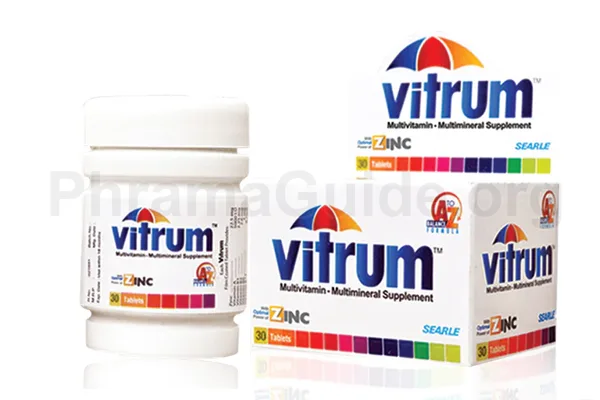Vitrum is primarily used to provide nutrients that may be lacking or insufficient in one’s daily intake. It is a dietary supplement that contains a combination of essential vitamins and minerals. Following are some common uses of Vitrum Tablet:
- Overall Health and Well-being: Using Vitrum tablets can contribute to overall health and well-being. It provides a broad spectrum of nutrients that support various bodily functions, including energy production, immune function, metabolism, nervous system function, and cellular processes.
- Micronutrient Deficiencies: Vitrum tablets can help address specific micronutrient deficiencies. Certain population groups, such as pregnant women, breastfeeding mothers, older adults, and individuals with specific medical conditions, may have higher nutrient requirements or be at an increased risk of nutrient deficiencies. Vitrum tablets can provide targeted nutrients to meet these increased needs.
- Antioxidant Support: Vitrum tablet contains antioxidant vitamins, such as vitamins C and E, which help neutralize harmful free radicals in the body. Antioxidants play a role in protecting cells from oxidative damage and reducing the risk of chronic diseases, such as heart disease and certain types of cancer.
- Bone Health: Vitrum tablets also contain calcium, vitamin D, and other nutrients important for bone health. So, it supports bone strength, density, and mineralization, reducing the risk of osteoporosis and fractures, especially in individuals at risk of inadequate calcium or vitamin D intake.
- Energy and Vitality: The use of Vitrum can contribute to energy production and vitality by providing essential nutrients involved in metabolic processes, such as B vitamins, iron, and magnesium. These nutrients support the conversion of food into energy and help maintain optimal energy levels throughout the day.
Off-label Uses of Vitrum Tablet
- Age-related Macular Degeneration (AMD): The specific formulations of multivitamins like Vitrum tablets, with high levels of antioxidants and zinc, may help slow the progression of AMD.
- Cognitive Function: Vitrum tablets may improve cognitive function in older adults with mild cognitive impairment or early dementia.
- Mood and Mental Health: Vitrum tablets may have a positive impact on mood and reduce symptoms of depression, particularly in individuals with nutrient deficiencies.
- Immune Function: Vitrum tablets may also support immune function, particularly in individuals with compromised immunity or during periods of increased susceptibility to infections.

What is Vitrum?
Vitrum is one of the leading brands of Multivitamins + Multiminrels, manufactured and marketed by Searle Pakistan (Pvt) Ltd.
Vitrum Alternatives : Other Similar Brands
The following are Some Alternative Brands of Vitrum and Their Manufacturers.
- Surbex Z : Abbott Laboratories Pakistan.
- Vida Z : High-Q International (Pvt) Ltd, Pakistan.
- Quantum Gold : Martindale Health Care.
- Hicap-M : Himount Pharmaceuticals.
- Mazivit M : Mass Pharma (Pvt) Ltd.
- Supradyn-N : Byer Schering Pharma (Pvt) Ltd.
- Visionace : Acti-Med Pharma (Pvt) Ltd.
- Pregnovit : Himount Pharmaceuticals.
- Neurovit-M : Unipharma (Pvt) Ltd.
- Dynamin-V : Stanpharma (Pvt) Ltd.
- Vivioptal : AGP (Pvt) Ltd.
- Multibionta-M : Merck (Pvt) Ltd.
Vitrum : Available Formulations and Strengths
Presently, Vitrum is available in Tablet form with the following strengths.
Each Vitrum Tablet Contains:
1.Vitamins Detail in Vitrum:
- Vitamin A: 5000IU
- Vitamin B1: 2.25mg
- Vitamin B2: 2.6mg
- Vitamin B6: 3mg
- Vitamin B12: 9mcg
- Vitamin C: 90mg
- Vitamin D: 400IU
- Vitamin E: 30IU
- Nicotinamide: 20mg
- Biotin: 150mcg
- Folic Acid: 400mcg
- Pantothenic Acid: 10mg
2. Minerals Detail in Vitrum:
- Calcium: 162mg
- Copper: 3mg
- Iron: 18mg
- Iodine: 150mcg
- Magnesium: 100mg
- Manganese: 7.5mg
- Potassium: 7.5mg
- Phosphorus: 125mg
- Zinc: 22.5mg
Who Should Not Use Vitrum?
Vitrum is generally considered safe for most individuals when used as directed. However, there are a few contraindications or precautions to consider.
- Hypersensitivity or Allergy: Individuals with known hypersensitivity or allergy to any of the ingredients in Vitrum should avoid its use.
- Medication Interactions: Certain vitamins and minerals in Virtum may interact with medications, affecting their absorption, efficacy, or metabolism. It’s important to consult with a healthcare professional, particularly if you are taking prescription medications, to ensure there are no potential interactions.
- Iron Overload: Vitrum contains iron so, individuals with iron overload disorders, such as hemochromatosis or hemosiderosis, should avoid Vitrum unless specifically recommended by a healthcare professional.
- Kidney Disease: Individuals with kidney disease or impaired kidney function should use caution when taking Vitrum tablets, as certain minerals, such as potassium and phosphorus, may need to be restricted or closely monitored.
- Vitamin A and D Toxicity: Excessive intake of vitamin A or vitamin D can be toxic. Virtum contains these vitamins, and if you have a medical condition that affects your metabolism, it’s important to discuss its use with a healthcare professional to avoid potential toxicity.
What is the Recommended Daily Dosage of Vitrum?
The recommended daily dose of Vitrum is to take One Tablet Every Day for Adults.
For better results, it is recommended to take Vitrum after Breakfast.
How Vitrum Works?
As we discussed above Vitrum is a combination of Vitamins and Minerals, These Vitamins and minerals are crucial components in numerous metabolic pathways within the body. They serve as coenzymes, cofactors, or catalysts for enzymatic reactions involved in energy production, macronutrient metabolism, and cellular processes.

Leave A Comment